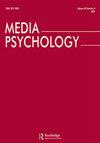家长报告儿童对COVID-19大流行新闻的恐惧反应:来自美国全国样本的结果
IF 2.6
2区 心理学
Q1 COMMUNICATION
引用次数: 1
摘要
摘要2020年4月17日至29日,我们在全国范围内对3岁至17岁儿童的父母进行了一项在线调查(N=1560)。据报道,大多数儿童受到新冠肺炎新闻报道的负面情绪影响(恐惧、不安或不安)。被问及的每一种压力症状(包括紧张、哭泣和睡眠问题)在被报道吓坏的儿童中都明显比不被报道吓到的儿童更普遍。开放式问题说明了一些回答的情感深度。被认为影响恐惧的覆盖因素存在发育差异。大多数惊恐儿童的父母都试图帮助孩子应对,但他们的策略选择与发展预期仅部分一致。卧室里有数码设备的孩子表现出更大的恐惧;在有惊恐儿童的家庭中传播的新冠肺炎消息比没有冻僵的儿童多;在控制了父母自身的恐惧以及父母与新冠肺炎确诊者的亲密关系后,媒体访问与儿童的恐惧强度和压力症状之间的关系仍然存在。鼓励家长监测儿童接触媒体传播的灾难的情况,注意儿童反应中潜在的年龄差异,并随时帮助儿童应对。本文章由计算机程序翻译,如有差异,请以英文原文为准。
Parent Reports of Children’s Fright Reactions to News of the COVID-19 Pandemic: Results from a National U.S. Sample
ABSTRACT Between April 17 and 29, 2020, we conducted a nationwide online survey of parents of children between the ages of 3 and 17 years (N = 1560). A majority of children were reported to be negatively emotionally affected (frightened, disturbed, or upset) by news coverage of COVID-19. Every stress symptom asked about (including nervousness, crying, and sleep problems) was dramatically more prevalent among children frightened than not frightened by the coverage. Open-ended questions illustrated the emotional depths of some responses. Developmental differences occurred in elements of coverage seen to influence fright. Most parents of frightened children tried to help their child cope, but their choices of strategies were only partially consistent with developmental expectations. Children with digital devices in their bedroom showed greater fear; more hours of COVID news were transmitted in homes with frightened than unfrightened children; and the relationship between media access and children’s fear intensity and stress symptoms remained after controlling for parents’ own fear and parents’ closeness with people diagnosed with COVID. Parents are encouraged to monitor children’s exposure to media-conveyed catastrophes, to be mindful of potential age differences in child responses, and to be available to help children cope.
求助全文
通过发布文献求助,成功后即可免费获取论文全文。
去求助
来源期刊

Media Psychology
Multiple-
CiteScore
8.60
自引率
7.10%
发文量
30
期刊介绍:
Media Psychology is an interdisciplinary journal devoted to publishing theoretically-oriented empirical research that is at the intersection of psychology and media communication. These topics include media uses, processes, and effects. Such research is already well represented in mainstream journals in psychology and communication, but its publication is dispersed across many sources. Therefore, scholars working on common issues and problems in various disciplines often cannot fully utilize the contributions of kindred spirits in cognate disciplines.
 求助内容:
求助内容: 应助结果提醒方式:
应助结果提醒方式:


